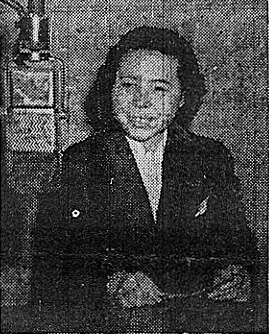Japan’s Women Urged to Use ’Master Key’ of Suffrage to Gain Free Growth, Happiness
Site Ed: The following item appeared in the Nippon Times, January 28, 1946. By then, Japanese women had been granted the vote by the Japanese Parliament at the recommendation of the Shidehara Cabinet. The voting age for both men and women was lowered from age twenty-five to twenty. Watanabe Michiko was one of the women who would work closely with Lt. Ethel Weed, head of Women’s Information in the Civil Information and Education Section of GHQ. The press and radio broadcasting were heavily utilized by the occupiers to reach ordinary Japanese and, in this case, to encourage women to cast votes in the first postwar elections, scheduled for April. Watanabe was also making a strong—and ultimately successful—case to revise the Civil Code of 1898.
 Miss Watanabe Michiko. With the "master key" of suffrage, Japanese women can "open all the doors which have shut them out from growth and happiness," Miss Watanabe Michiko declared in a radio address over Radio Tokyo Sunday night.
"Whether we are able to reconstruct a new Japan or not depends upon the proper use of this key," she stressed.
Miss Watanabe, one of the total of 11 women lawyers in Japan made this special radio talk to discuss Japanese women’s new right to vote an the improvements they can make in their legal position by their vote.
Japanese women should, first study which closed door they wish to open, she advised. Without much study, Japanese women know what they want in the way of the improvements in humanity, economics and education, she said. To improve their legal position, they must become acquainted with those provisions in the Civil and Criminal Law "which have prevented the free growth of women," he emphasized.
Changes should be made in the Law to give husbands and wives equal rights, she believes. She pointed out that now a woman who is classified in the same category as a quasi-incompetent, must obtain permission from her husband to undertake any important act; she has the right to inherit her husband’s property only if there is no child it the family; she suffers from a divorce law designed to favor the husband.
These Codes adopted in 1897 are "full of feudalistic ideas," she stressed. Proposed revisions made public in 1927 are "not suitable in the present situation, when women are going to make a great advance," she said.
She proposed that a Committee for the Revision of the Civil Law be appointed, and that it include women members. Women should take an interest in this vital matter, and make every effort to stir up a "strong public opinion for revision" of these discriminatory laws, she declared.
Miss Watanabe is a graduate of the law course at Waseda University, Tokyo, and took the Japanese Government lawyer’s examination in November, 1945. She is now practicing law in Tokyo.
"I want to make helping delinquent children in Japan my life work," she said "If juveniles receive the proper help, they will not grow up to be hardened criminals."
.........................
Reference
"Japan’s Women Urged to Use ’Master Key’ of Suffrage to Gain Free Growth, Happiness," Nippon Times Magazine, January 28, 1946.
| 